Along with fielding a survey of public attitudes toward Black Lives Matter, political engagement and activism on social media in general, Pew Research Center also conducted a separate analysis of activity around #BlackLivesMatter on Twitter.
The phrase “Black lives matter” first appeared in a July 2013 Facebook post by activist Alicia Garza, following the acquittal of George Zimmerman in the shooting death of Trayvon Martin. Use of #BlackLivesMatter as a hashtag quickly spread to other social media sites such as Twitter.
Over the ensuing decade, the Black Lives Matter movement has been a consistent and substantial topic of conversation on Twitter. We collected all publicly available tweets containing the #BlackLivesMatter hashtag going all the way back to 2013 – more than 44 million tweets in total.5
We then examined these tweets to understand:
- How the volume of tweets tagged with the #BlackLivesMatter hashtag has changed over time;
- Whether these tweets express support or opposition to the movement as a whole;
- How often these tweets mention policing or police violence;
- How audiences engaged with and amplified these tweets;
- What other hashtags are included alongside #BlackLivesMatter.
How use of the #BlackLivesMatter hashtag has changed over time
Over the last decade, the #BlackLivesMatter hashtag has appeared in 3,024 tweets on a typical (median) day. However, its use has surged well above this baseline around major news events – often those involving incidents where Black Americans were killed by police.
Use of the #BlackLivesMatter hashtag increased dramatically in November 2014, to a peak of more than 95,000 times in a single day. This increase followed the announcement that Ferguson, Missouri, police officer Darren Wilson would not be indicted in the fatal shooting of Michael Brown.
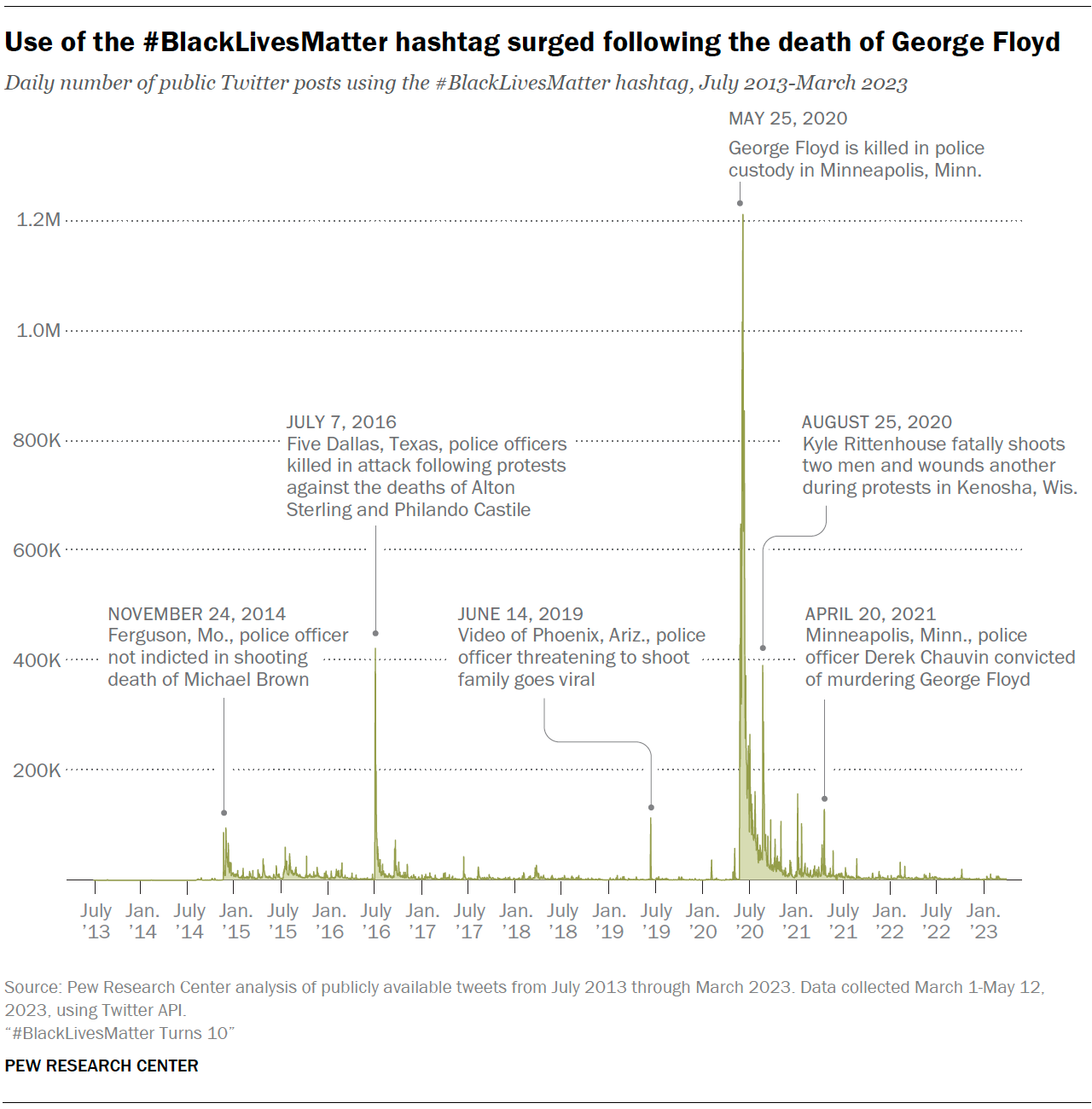
Another notable spike – to a peak of more than 422,000 tweets in a single day– occurred in July of 2016. Alton Sterling was killed by police officers in Baton Rouge, Louisiana, on July 5 of that year. Philando Castile was killed the next day by an officer outside St. Paul, Minnesota. During the protests following these deaths, multiple police officers in both Dallas, Texas, and Baton Rouge, Louisiana, were shot and killed.
But the most active period by far for #BlackLivesMatter on Twitter was summer 2020, following the murder of George Floyd by Minneapolis police officer Derek Chauvin. During this period, the hashtag was used more than 160,000 times a day, on average, and peaked at over 1.2 million uses in a single day.
Of the 44 million tweets from the last decade using the #BlackLivesMatter hashtag that were still available at the time of this study, more than half – 24.5 million – were posted between the beginning of May and the end of September 2020.
Summer 2020 marked a new high point for references to #BlackLivesMatter on Twitter
In addition to being the most active period for #BlackLivesMatter on Twitter, summer 2020 also marked a shift in how frequently the hashtag would be referenced on the platform moving forward. Prior to May 2020, #BlackLivesMatter appeared in around 151,000 tweets per month, on average. From October 2020 through March 2023, it appeared in nearly 236,000 tweets per month – an increase of 56%.
How many users have tweeted about #BlackLivesMatter
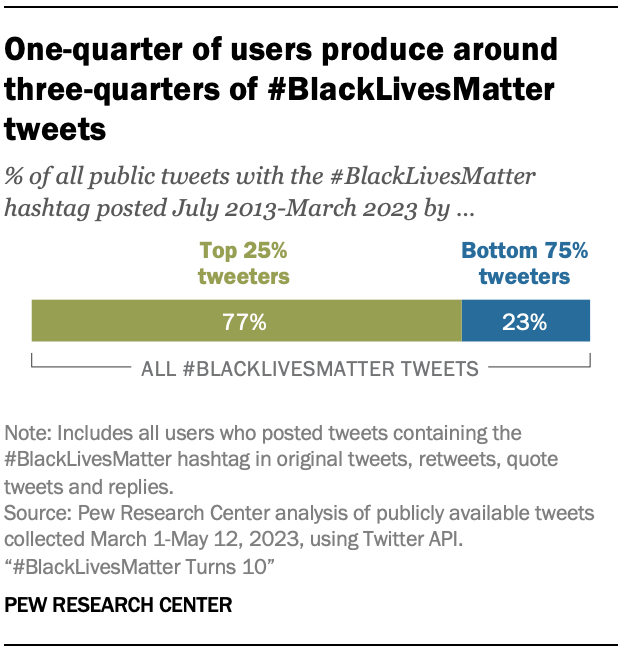
Nearly 10 million distinct users posted or retweeted a tweet containing the #BlackLivesMatter hashtag between 2013 and 2023. But similar to tweeting behavior among the general public, #BlackLivesMatter tweets are highly concentrated among a smaller subset of users. More than half of the users who have posted a tweet containing the hashtag only did so one time and never again subsequently. And of the 44 million tweets examined for this analysis, 77% – or 34 million – were shared by just one-quarter of the users who ever posted the hashtag.
Summer 2020 was also a high-water mark for the number of distinct users participating in the #BlackLivesMatter conversation on Twitter. Some 6.8 million distinct users shared a tweet with the hashtag between May and September 2020, and of those, 85% – or 5.8 million users – had never used the #BlackLivesMatter hashtag before.
When Twitter users do share a tweet with #BlackLivesMatter, they are more likely to be using someone else’s words rather than their own. Of the over 44 million total tweets collected for this analysis, 56% are retweets. Quote tweets, replies and original tweets together make up 44% of the collection.
Expressions of support and opposition to the #BlackLivesMatter movement over time
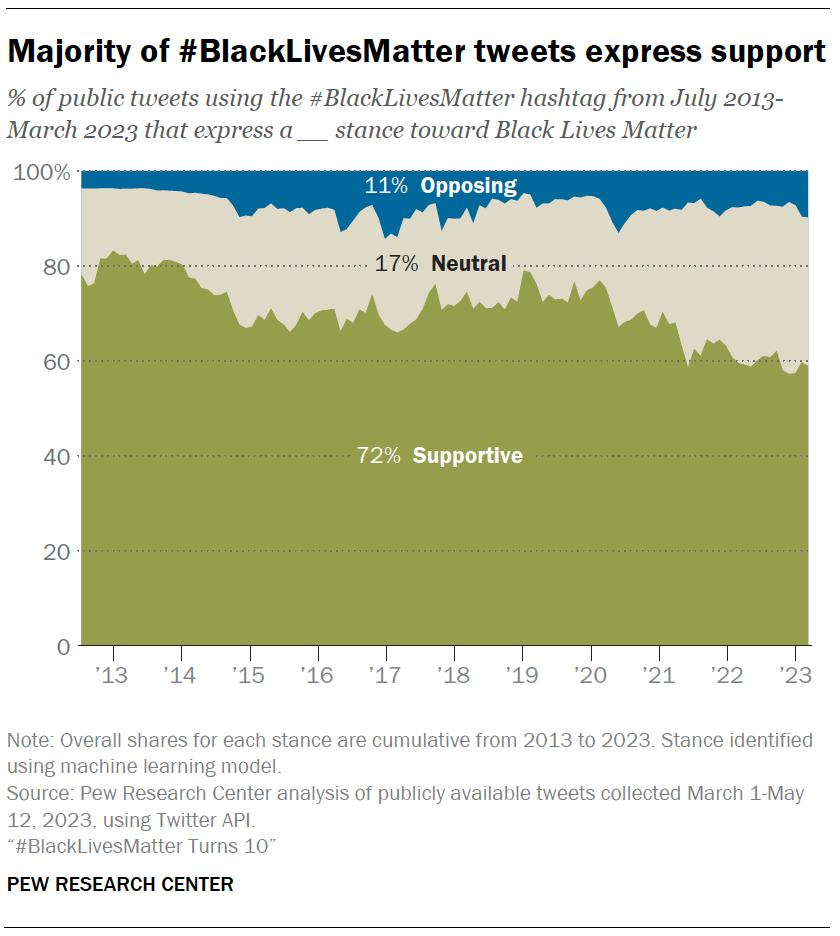
The vast majority of #BlackLivesMatter tweets posted in the last decade have taken a stance – typically a positive one – toward the broader social movement the hashtag represents. Cumulatively since 2013, 72% of #BlackLivesMatter tweets have expressed clear support for the wider movement and its objectives. Conversely, 11% of these tweets have expressed clear opposition for the movement. The remaining 17% of tweets do not state a clear position. The share of tweets with a neutral stance has increased slightly in recent years. But overall, the broad distribution of opinions in these tweets has remained relatively consistent in expressing support for the movement as a whole.
Language used in tweets that support and oppose the broader movement
Supportive and oppositional tweets often use different words to frame the Black Lives Matter movement and major events surrounding it.
Supportive tweets are frequently characterized by words like:
- Together
- Justice
- Change
- Fight
- Brutality
- Murder
By contrast, opposing tweets often use words like:
- Riot, looting (when discussing Black Lives Matter protests)
- Assault
- Defacing
- Criminal, violent, Marxist, terrorist, antifa (when describing Black Lives Matter supporters)
One-third of #BlackLivesMatter tweets since 2013 mention police violence or its victims
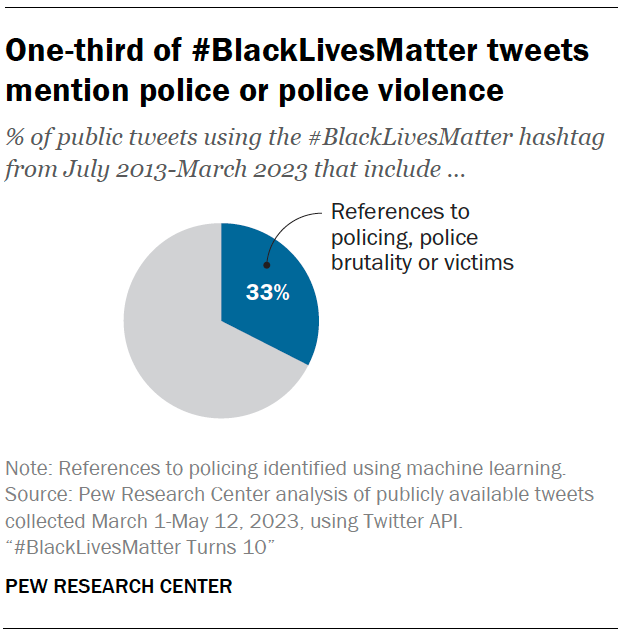
The Black Lives Matter movement and hashtag first grew to prominence in response to the killing of Michael Brown by police officer Darren Wilson in Ferguson, Missouri. Issues of policing and its impact on Black Americans remain at the forefront of discourse around the hashtag. Our analysis finds that one-third of tweets using the #BlackLivesMatter hashtag have included references to policing, police brutality, or have included the names of Black people killed by police.
This share has remained remarkably consistent over the course of the last decade. Despite all the changes in the technological and political landscapes that have occurred during this time, racialized policing has remained at the core of the online discourse surrounding the Black Lives Matter movement.
The most common hashtags used in #BlackLivesMatter tweets
This analysis is based on tweets containing the #BlackLivesMatter hashtag. But 55% of these tweets over the last decade also included other hashtags alongside #BlackLivesMatter. Particularly in the early years of the movement, the most popular of these “co-occurring” hashtags included references to victims of police violence or the circumstances surrounding those events.
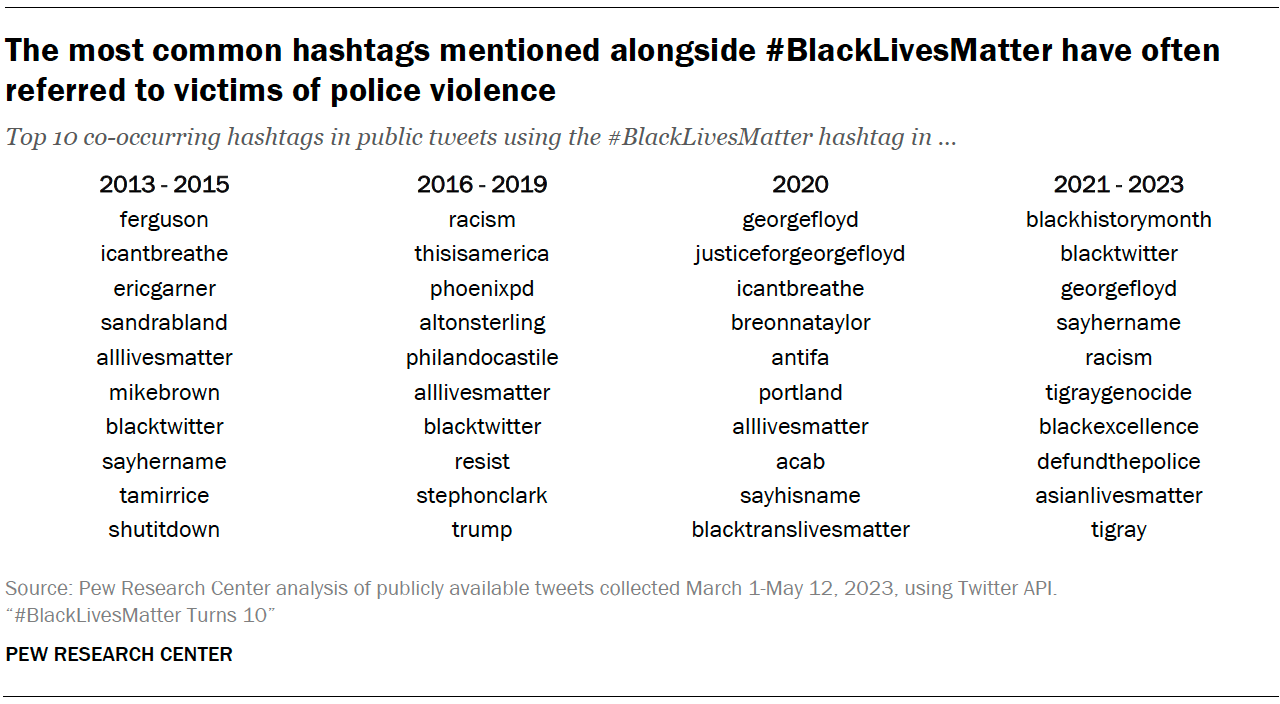
Other hashtags that commonly occur alongside #BlackLivesMatter include an expanded range of issues and concerns. These include general references to Black history and culture (#BlackHistoryMonth, #BlackTwitter, #BlackExcellence); broader social movements and issues, both in the United States and abroad (#TigrayGenocide, #DefundThePolice, #AsianLivesMatter); and other issues related to politics and current events (#Trump, #resist, #antifa). Additionally, #AllLivesMatter – a hashtag frequently used to critique or oppose the Black Lives Matter movement – also appears somewhat commonly in these tweets.
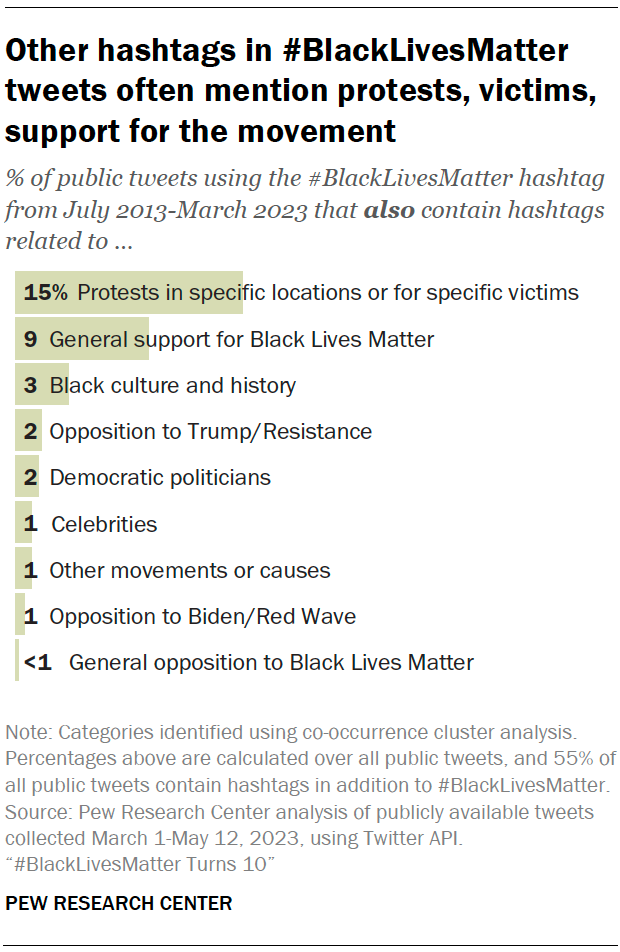
As a broader look at how other hashtags are used to link #BlackLivesMatter tweets to expanded audiences and conversations, we identified several common topical hashtag groupings that appear consistently in these tweets. And as is true of the most common individual hashtags discussed above, the most common grouping refers to the location of specific protests (such as #Ferguson) or individual victims of police violence (such as #GeorgeFloyd). Hashtags from this group have been mentioned in 15% of #BlackLivesMatter tweets over the last decade.
Other somewhat common hashtag groupings offer general support for the broader movement or reference Black culture and history. Smaller shares refer to U.S. politicians or politics, celebrities, or non-Black Lives Matter movements and causes.
Audience engagement with #BlackLivesMatter tweets
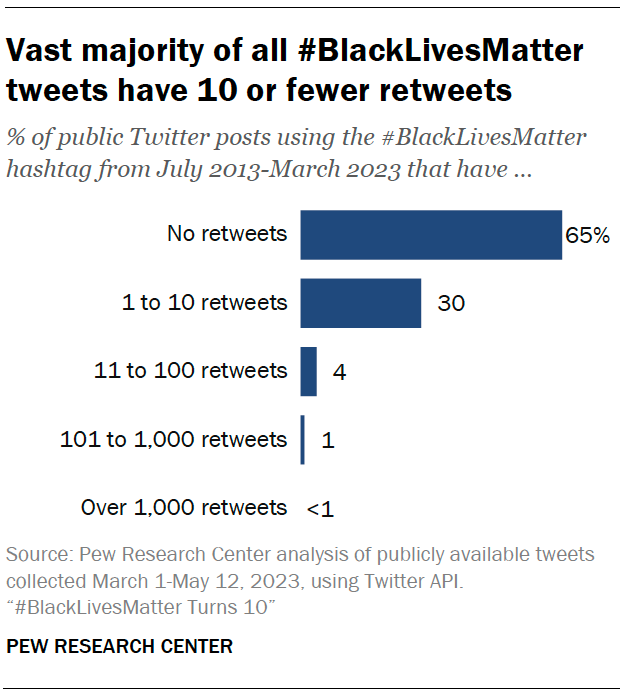
Retweeting is one of the primary ways that messages are “amplified” on Twitter: Tweets reach new audiences when they are shared by others, and these retweets are often shared again, and so on. Tweets containing the #BlackLivesMatter hashtag over the last decade were retweeted an average of 18 times each.
But a majority of these tweets never traveled outside their original author’s network: 65% of these posts were retweeted zero times. Another 30% received 1 to 10 retweets.
Only a small proportion (just 1%) of #BlackLivesMatter posts were retweeted more than 100 times. But this small group of high-engagement tweets accounts for the vast majority (90%) of all retweets of the hashtag over the last decade.
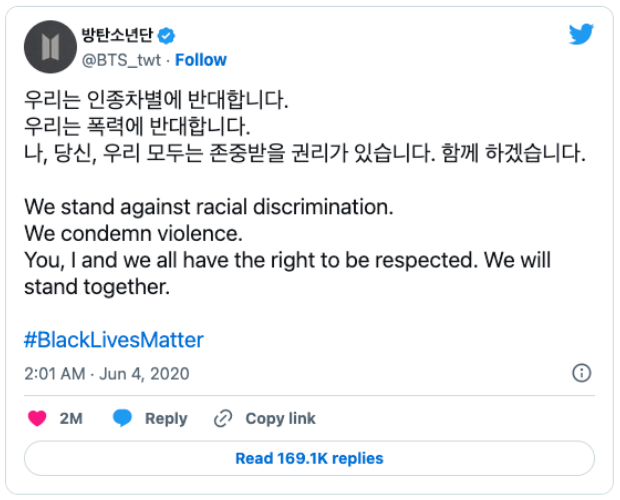
By far the most retweeted #BlackLivesMatter tweet from the last 10 years was a June 2020 post by the Korean pop group BTS, which at the time of writing had been retweeted over 831,000 times. Retweets of just this post represent nearly 2% of all publicly available tweets tagged with #BlackLivesMatter from the past decade.
Of those tweets that did rise to prominence, many came from activists, musicians or other celebrities. But some tweets that garnered hundreds of thousands of retweets were originally posted by individual users on their personal accounts.
And of the twenty most retweeted posts with the #BlackLivesMatter hashtag, all are supportive of the movement. Some simply offer general support for the movement and its values, while others document protests or call attention to specific victims of police violence. Even in conversation about a serious social movement, a notable portion of the most retweeted tweets (4 out of 20) use humor to get their point across. The vast majority include a photo or video, but few include explicit calls to action.
Favorable #BlackLivesMatter tweets have wider reach on the platform
Much like the volume of tweets containing the #BlackLivesMatter hashtag, the volume of retweets has not been evenly distributed over time. June 8, 2020, was the day with the single highest volume of retweets for posts with the hashtag. And all of the top five days by retweet volume fell between June 5 and June 9, 2020, two weeks after George Floyd’s murder. Summer 2020 as a whole was the most active time for retweets related to Black Lives Matter in the last decade.
Sometimes spikes in retweet volume corresponded to many unique users tweeting about a widely publicized news event, such as Floyd’s murder. Other times, one viral tweet was primarily responsible for a daily spike. For example, an increase in retweets on June 15, 2019, was largely due to a video tweeted by media outlet Occupy Democrats of a police officer in Phoenix, Arizona, threatening to shoot a Black family. That tweet was then amplified through retweets by Meek Mill, YG, Jemele Hill and other celebrities, and accounts for 97% of all retweets of the hashtag on the day it was posted.
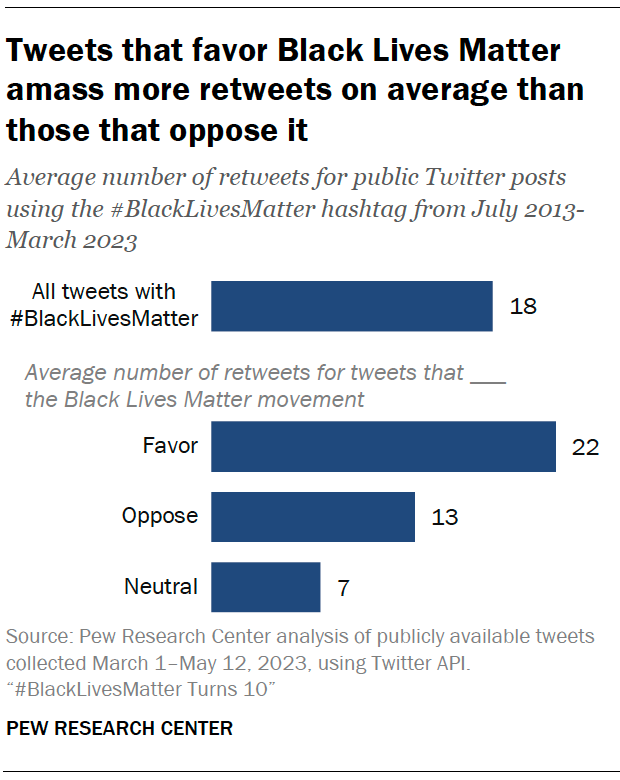
Tweets supporting the Black Lives Matter movement received more retweets on average than tweets opposing the movement. Supportive tweets were retweeted an average of 22 times, while opposing tweets were retweeted 13 times on average. Neutral tweets had the lowest average retweet count (7). But the majority of tweets, regardless of stance, were not retweeted at all, with 63% of supportive tweets, 72% of oppositional tweets and 71% of neutral tweets receiving zero retweets.
Many #BlackLivesMatter tweets can no longer be viewed on Twitter
Conversation around the hashtag #BlackLivesMatter has been a consistent and culturally impactful presence on Twitter over the past decade. However, data on Twitter can be impermanent – Twitter users can delete tweets they previously posted, they can deactivate their account or make it private, or they can be suspended by the platform itself. When any of these things happens, tweets that were previously available to view publicly can disappear from the record entirely.
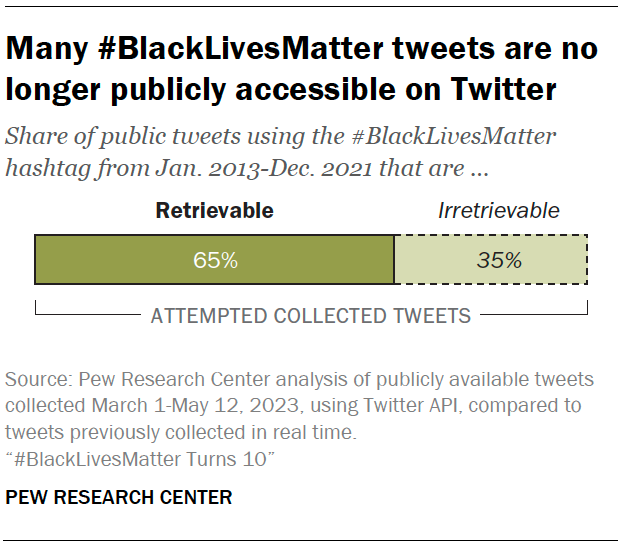
The Center’s new analysis is based on tweets tagged with #BlackLivesMatter that were publicly available as of spring 2023. But we were also able to reference past data collection efforts to estimate the share of #BlackLivesMatter tweets that have been deleted or otherwise become inaccessible over the years. According to this comparison, 35% of #BlackLivesMatter tweets created between 2013 and 2021 are no longer available on the platform. That share is even higher when looking at tweets created in summer 2020 – the highest peak of activity for the hashtag. Out of all the #BlackLivesMatter tweets posted between May and September 2020, fully 40% are no longer accessible.




